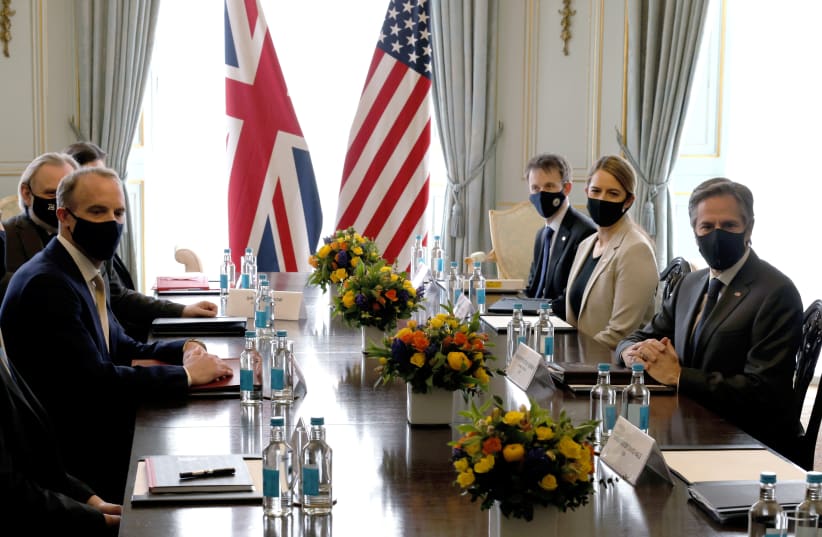China denounced the joint statement by the G7 that had scolded Beijing over a range of issues as a gross interference in the country's internal affairs, and urged the grouping to stop slandering China.
Monday's NATO summit, described as a "pivotal moment" by Secretary-General Jens Stoltenberg, aims to show President Joe Biden that the alliance remains a central support for US efforts to uphold peace and democracy around the world, including standing up to China and its rapid military rise.
Diplomats said the NATO summit's final communique would not call China an adversary but would demonstrate concern, calling it a "systemic" challenge to Atlantic security as it joins Russia with military drills, launches cyber attacks and rapidly builds up its navy.
Leaders of the Group of Seven rich democracies, meeting in Britain over the weekend, scolded China over human rights in its Xinjiang region, called for Hong Kong to keep a high degree of autonomy , underscored the importance of peace and stability across the Taiwan Strait and demanded a full and thorough investigation of the origins of the coronavirus in China.
China's embassy in London said it was resolutely opposed to mentions of Xinjiang, Hong Kong and Taiwan that it said distorted the facts and exposed the "sinister intentions of a few countries such as the United States."
With the COVID-19 pandemic still raging and global economy sluggish, the international community needs unity and cooperation of all countries rather than "cliquey" power politics sowing division, it added.
China is a peace-loving country that advocates cooperation, but also has its bottom lines, the embassy said.
"China's internal affairs must not be interfered in, China's reputation must not be slandered, and China's interests must not be violated," it added.
"We will resolutely defend our national sovereignty, security, and development interests, and resolutely fight back against all kinds of injustices and infringements imposed on China."
China's embassy said the G7 should do more that is conducive to promoting international cooperation instead of artificially creating confrontation and friction.
"We urge the United States and other members of the G7 to respect the facts, understand the situation, stop slandering China, stop interfering in China's internal affairs, and stop harming China's interests."
The embassy also said working on looking at the origins of the COVID-19 pandemic should not be politicized, after the G7 in the same statement demanded a full and thorough investigation of the origins of the coronavirus in China.
The joint expert group on the virus between China and the World Health Organization has been conducting research independently and following WHO procedures, the embassy added.
"Politicians in the United States and other countries ignore facts and science, openly question and deny the conclusions of the joint expert group report, and make unreasonable accusations against China.
White House national security adviser Jake Sullivan said on Sunday G7 leaders rallied around the need to "counter and compete" with China on challenges ranging from safeguarding democracy to technology.
"China will feature in the (NATO) communique in a more robust way than we've ever seen before," Sullivan told reporters aboard Biden's plane, Air Force One, from the G7 summit in England to the Belgian capital.
Since Russia's 2014 annexation of Crimea, NATO has modernized its defenses but has only recently begun to look more seriously at any potential threat from Chinese ambitions.
From China's investments in European ports and plans to set up military bases in Africa to joint military exercises with Russia in the Baltic, NATO is now agreed that Beijing's rise deserves a strong response.
Meanwhile, Russia's efforts to divide the West will run through discussions, diplomats said, ahead of a meeting between Biden and Russian President Vladimir Putin on Tuesday in Geneva.
"The relationship between NATO and Russia is at a low point, the lowest point since the end of the Cold War," Stoltenberg told The Times Radio on Sunday.
"We see the willingness to use military force against neighbors; Ukraine, Georgia. But we also see cyber attacks. We see attempts to meddle in our political democratic processes, to undermine the trust in our institutions and efforts to divide us," he said.
Given the threats, leaders hope to hear Biden recommit the United States to NATO's collective defense after his predecessor Donald Trump's confrontational rhetoric towards allies from 2017 to 2019 at NATO summits created an impression of crisis, envoys said.
"We believe that NATO is vital to our ability to maintain American security and I want them to know that NATO is a sacred obligation," said Biden on Sunday at the end of the G7 before flying to Brussels.
